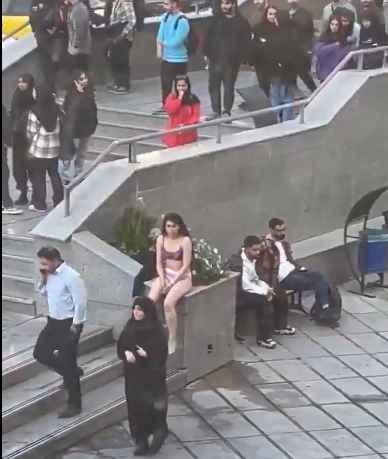November 09,2024
A young woman stripped to her underwear at Islamic Azad University in Tehran November 2 in an apparent extreme protest against the dress code.
 A video posted on social media showed security guards at a branch of the Islamic Azad University detaining the unidentified woman. University spokesperson Amir Mahjob said on X that “at the police station,… it was found that she was under severe mental pressure and had a mental disorder.”
A video posted on social media showed security guards at a branch of the Islamic Azad University detaining the unidentified woman. University spokesperson Amir Mahjob said on X that “at the police station,… it was found that she was under severe mental pressure and had a mental disorder.”
There was no way to know if that was true. The identity of the woman has not yet been publicized and nothing was known about her.
“For most women, being … in their underwear in public is one of their worst nightmares.… This is a reaction to the [authorities’] stupid insistence on the mandatory hejab,” Leila, a user on X, said in a comment accompanying the video.
The fate of the woman was not known, but the daily Hamshahri said on its website: “An informed source said … the perpetrator of this act has severe mental problems and, after investigations, she will most likely be transferred to a mental hospital.”
Fars news agency said the student had worn “inappropriate clothes” in class and “stripped” after being warned by security guards to comply with the dress code.
It insisted the security guards spoke “calmly” with the student and denied other reports that their actions had been aggressive and that she was beaten while she being taken to a police station.
A video showing the student sitting in the courtyard of the university’s Science and Research Branch has gone viral on Iranian social media. What is remarkable is that none of the people walking near her in the video are paying any attention to her, perhaps too embarrassed or frightened of the authorities even to acknowledge her presence.
A university official confirmed her arrest. “Following an indecent act by a student at the Science and Research Branch of the university, campus security intervened and handed the individual over to law enforcement authorities,” Amir Mahjoub, Director General of Public Relations at Islamic Azad University, wrote on X. “The motives and underlying reasons for the student’s actions are currently under investigation,” he said, without making any assertions about her mental state.
On the same day, Amir Kabir Newsletter, a student group on Telegram, reported the student disrobed after being harassed for not wearing a headscarf and having her clothing torn by security forces. During the student’s arrest, she was subjected to severe physical assault, including her head striking either a car door or a pillar, which caused heavy bleeding. “Blood stains from the student were reportedly seen on the car’s tires,” the report said.
The Telegraph of London quoted one eyewitness it reached as saying, “Around noon, near the entrance of the faculty, I saw a girl being grabbed and forcibly taken by security forces.
“She wasn’t wearing a headscarf. Then they reached the security building near the entrance, where a male and a female security guard grabbed her and tried to take her into the office with force.
“She resisted, and her hoodie was torn off her body, it made her very angry and she took off the rest of her clothes.
“She angrily yelled at them and took off her trousers. She sat outside the campus for a few minutes and the officer became more aggressive.
“I couldn’t see much but, a few minutes after she started walking, several plain-clothes officers ambushed her and forced her into a car.”
State-affiliated outlets later circulated a video of a man identifying himself as her husband, who claimed she was the mother of two and claimed that she had mental health issues.
The incident has since drawn public backlash online, with social media users denouncing what they see as a familiar tactic used by authorities to delegitimize female protestors by labeling them as mentally unstable.
Hossein Ronaghi, an activist who was jailed during the 2022 protests, in a post on X hailed the “bravery” of the student and described her action as a “cry from the bottom of the heart against the oppression that has taken the life out of people, especially women.”
The disrobing episode came after IranWire reported an increased push to enforce mandatory hejab on university campuses.
It said some university professors have begun awarding “Islamic and moral attire” points for compliance with the dress code. The professors, often teaching specialized and practical courses, sometimes allocate up to five points for midterm and practical test scores based on adherence to the hejab. Iran uses a 20-point grading system.
A visual arts student in Tehran told IranWire, “For two years now, different methods have been used to suppress students. Some professors have even stated on the first day of class that midterm or practical exam scores will start at 15 or 16 out of 20, with the remaining points dependent on hejab compliance.”
Professors at several universities now offer academic benefits to students who marry or become pregnant during the semester, implementing the Population Growth policy endorsed by Supreme Leader Ali Khamenei.
These incentives include “exemptions from class attendance,” “up to 10 additional points on midterms,” “full scores in practical courses,” and even “leniency in dissertation and defense stages,” primarily for master’s and doctoral students.
A student told IranWire, “These professors, who often teach courses critical to students’ academic trajectories, sometimes offer up to half the exam points as a ‘wedding gift’ to those who marry. Additionally, pregnant students are excused from classes and even practical exams, receiving full marks.”
In another development, President Pezeshkian’s spokeswoman, Fatemeh Mohajerani, acknowledged that women were still being harassed over non-compliance with the dress code despite Pezeshkian’s pledge to stop such police actions. Mohajerani, who wears a traditional black chador, added that dress code compliance cannot be achieved through force. She stressed that Pezeshkian stands by his pledge to try to stop such coercive measures.
New legislation laying out penalties for failing to adhere to the dress code was approved by the Council of Guardians October 19. Under Iran’s Constitution, the president has no veto authority over legislation and is required to publish new laws in the state gazette within five days of receiving notification of final approval from the Majlis.
Both Presidents Mahmud Ahmadi-nejad and Hassan Rohani occasionally refused to do that. So, the Majles authorized the speaker of the Majles to do so.
Iran International reported that as of the start of November, the new hejab law had not been published in the gazette because neither President Pezeshkian nor Speaker Mohammad-Baqer Qalibaf had submitted it for publication.
























